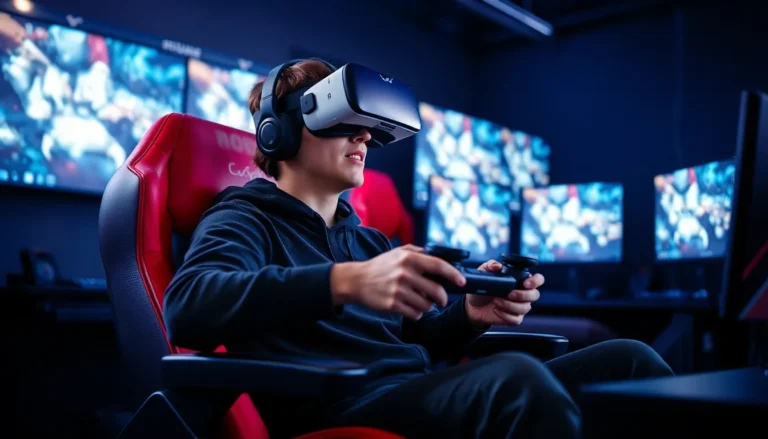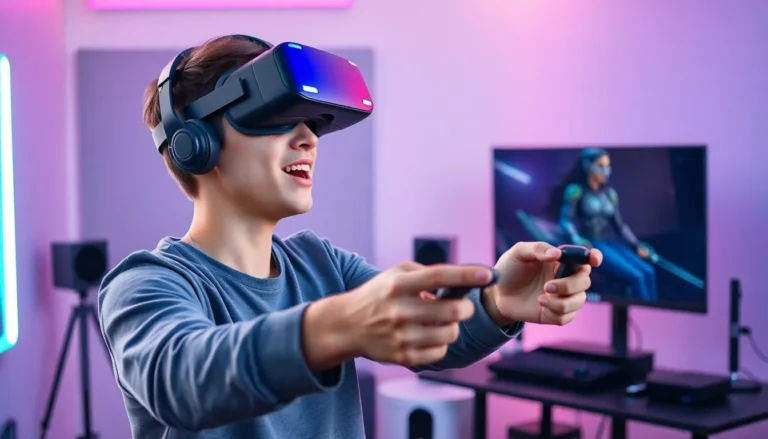Imagine diving headfirst into a virtual world where dragons soar and aliens lurk around every corner. That’s the magic of VR gaming, and it all starts with the right gaming PC. If you’re tired of watching your friends battle it out in immersive realms while you’re stuck on the sidelines, it’s time to upgrade your setup.
A powerful VR gaming PC isn’t just a luxury; it’s a ticket to experiences that’ll have you questioning reality itself. With cutting-edge graphics and lightning-fast processing, these machines transform gaming into an adventure that feels all too real. So buckle up and get ready to discover how the right hardware can catapult you from couch potato to virtual hero in no time. After all, who wouldn’t want to slay a dragon while still in their pajamas?
Table of Contents
ToggleUnderstanding VR Gaming PCs
VR gaming PCs are specially designed to provide an immersive virtual reality experience. These powerful machines ensure smooth graphics and quick responses crucial for enjoyable gameplay.
What Is a VR Gaming PC?
A VR gaming PC refers to a desktop or laptop tailored to handle the demands of virtual reality environments. It features high-performance components that enable realistic graphics and responsive controls. Gamers utilize these PCs to engage with VR headsets like the Oculus Rift or HTC Vive, providing an outstanding level of immersion. Many players seek out VR gaming PCs specifically to experience a new dimension in gaming that traditional setups often cannot deliver.
Key Components of a VR Gaming PC
Key components of a VR gaming PC include the graphics card, processor, memory, and storage. The graphics card plays a critical role, often requiring top-tier models like NVIDIA GeForce RTX 30 series or AMD Radeon RX 6000 series to handle demanding VR graphics. Processors such as Intel Core i5 or AMD Ryzen 5 provide the necessary speed for seamless performance. Memory should ideally start at 16 GB, enabling multitasking without lag. Storage solutions, including SSDs, enhance load times, significantly improving the overall VR experience. These components work together to create the fluid environments gamers expect in virtual reality.
Choosing the Right VR Gaming PC

Selecting the right VR gaming PC enhances the virtual reality experience. Two primary options exist: pre-built systems and custom builds.
Pre-built vs. Custom Builds
Pre-built gaming PCs offer convenience and guaranteed compatibility. Brands like Alienware and HP provide models specifically optimized for VR. Custom builds give users flexibility in choosing components and often yield better performance for the budget. Gamers can select high-end graphics cards and processors tailored to their preferences. Custom setups also allow for personal style, with options for unique cases and aesthetics. Many enthusiasts enjoy the building experience, seeing it as a hobby.
Essential Specs to Consider
Essential specifications for VR gaming PCs include the graphics card, processor, RAM, and storage. A graphics card with at least 6GB of VRAM is recommended for smooth gameplay. Processors from Intel i5 or AMD Ryzen 5 or higher provide sufficient power for demanding applications. Memory should measure at least 16GB to accommodate multitasking effectively. For storage, SSDs offer faster loading times compared to traditional HDDs, recommended for VR libraries. Compatibility with VR headsets also remains crucial for overall system performance.
Setting Up Your VR Gaming PC
Setting up a VR gaming PC requires attention to key hardware and accessories as well as precise installation steps. Proper configuration ensures optimal performance for an immersive gaming experience.
Required Hardware and Accessories
A VR gaming setup consists of several essential components. A powerful graphics card with a minimum of 6GB of VRAM ranks as the foremost requirement. An Intel i5 or AMD Ryzen 5 processor offers the necessary speed for fluid gameplay. Memory is also crucial; 16GB of RAM enables smoother multitasking. An SSD for storage accelerates loading times, enhancing overall performance. VR headsets, like the Oculus Quest or HTC Vive, complete the experience, providing the visual immersion essential for gameplay. Ensure compatibility among all components to avoid performance issues.
Installation and Configuration Tips
Beginning setup involves connecting the VR headset to the gaming PC. Use USB and HDMI connections to link the headset, followed by installing necessary drivers for optimal performance. Configure display settings to match the headset’s resolution for clarity. Updates for software ensure the latest features and performance enhancements are in place. Calibrate room-scale tracking to enhance movement within the virtual space effectively. Testing the setup with a demo VR application assists in fine-tuning adjustments for an immersive experience. Regularly check for updates and maintain the hardware to ensure long-lasting performance.
Best VR Gaming PCs on the Market
The market offers various exceptional VR gaming PCs, each designed to deliver immersive experiences. Selecting the right model enhances gameplay and visual fidelity, making virtual adventures even more engaging.
Top Brands and Models
Leading brands like Alienware, HP, and ASUS dominate the VR gaming landscape. Alienware Aurora R15 offers Intel i7 or AMD Ryzen 7 processors paired with NVIDIA RTX 3060 graphics cards. HP Omen 45L features customizable components, ensuring high performance for demanding VR titles. ASUS ROG Strix G15 comes equipped with a powerful RTX 3070, ideal for seamless gaming. These models provide robust cooling solutions and ample storage, making them top choices for VR enthusiasts.
Budget Options
For gamers seeking affordability, several solid options exist. The CyberPowerPC Gamer Xtreme VR packs an Intel i5 processor and GTX 1660 graphics, delivering a satisfactory VR experience without breaking the bank. The iBUYPOWER Trace 4 is another budget-friendly choice, featuring an AMD Ryzen 5 and GTX 1650, which offers decent performance. Lastly, the SkyTech Archangel is an excellent entry-level PC, powered by a Ryzen 5 and RTX 2060. These systems provide essential specifications without overspending.
Embracing VR gaming opens up a realm of unparalleled adventures. A powerful gaming PC is essential for experiencing the full potential of virtual reality. Whether opting for a pre-built system or a custom build gamers can ensure their setup meets the demands of immersive gameplay.
With the right components like a robust graphics card and ample memory players can dive into breathtaking worlds and engage in thrilling challenges. Investing in a quality VR gaming PC not only enhances the gaming experience but also keeps players at the forefront of this evolving technology.
As the VR landscape continues to grow upgrading or building a capable system will keep gamers ready for the next big adventure.





